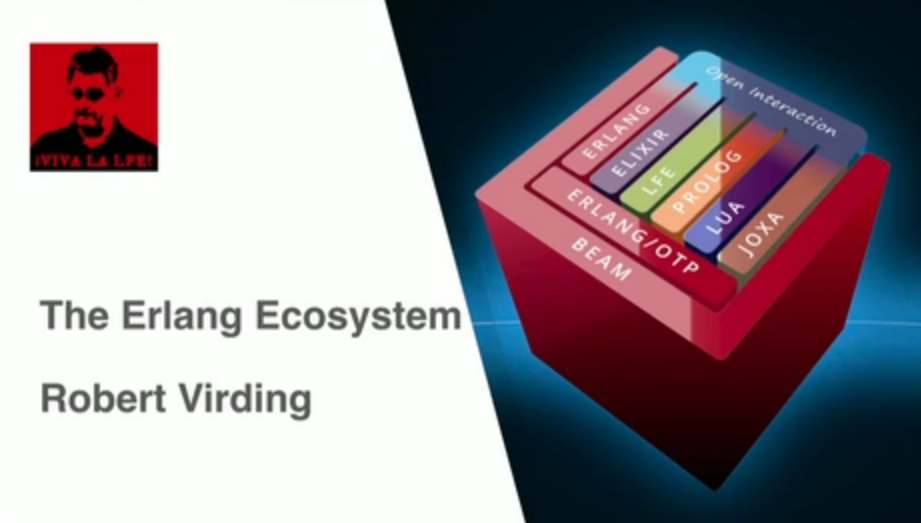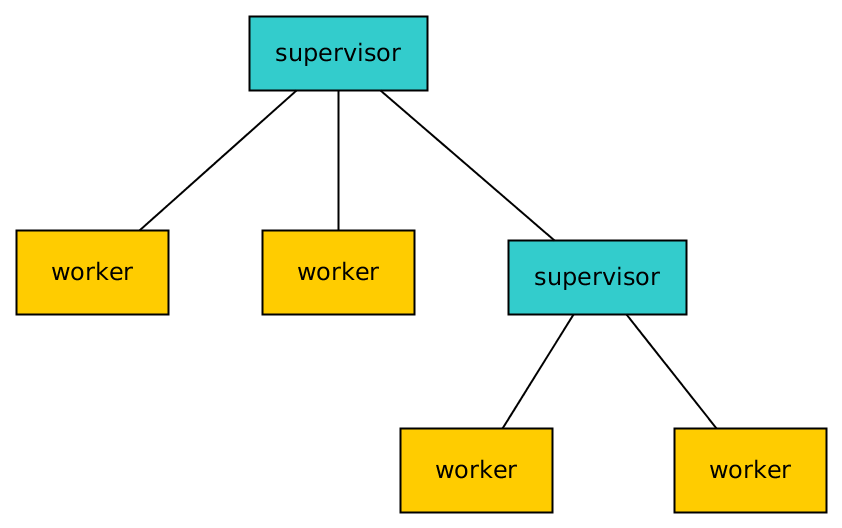Elixir

Plus qu'un langage, une plateforme
Concurrence et parallélisme¶
Pourquoi faire ?¶
Faire plusieurs choses en même temps¶
- servir plusieurs utilisateurs en même temps (WebSockets)
- ne pas bloquer lors d'accès à des ressources externes (I/O)
- effectuer plusieurs calculs en même temps
Exploiter tous les coeurs de la machine¶
La vitesse des processeurs n'augmente plus beaucoup mais le nombre de coeurs augmente.
Inconvénients¶
- consommateur de ressources
- mécanismes de communication spécifiques (IPC)
Inconvénients¶
- mécanismes d'exclusion mutuelle nécessaires
- encore relativement consommateur de ressources
Inconvénients¶
- impact important sur le code (callbacks, async/await)
- pas de parallélisme possible
- pas d'isolation des erreurs

Source : Erlang the Movie (lien YouTube)
Erlang/OTP¶
- processus légers isolés
- code séquentiel pas impacté
- passage de messages natifs
mutexes,synchronizedrace conditions
Mais encore !¶
- tolérance aux erreurs
- programmation distribuée
- mise à jour de code à chaud
- bonne performance ressentie
Et bien sûr¶
Libre depuis 1998. Actuellement sous licence Apache 2.0
Inconvénients¶
- syntaxe étrange, eg. plusieurs séparateurs d'expression :
,;et. - support limité des namespaces et chaines de caractères
- outillage un peu à la traine (tests, build, doc, gestions de dépendances, etc.)
- ambience un peu old-school

Joe Armstrong en 1990 dans Erlang the Movie (lien YouTube)

Source : The Erlang Ecosystem - Robert Virding (lien Vimeo)
Elixir¶
- Construit sur la machine virtuelle et le framework de Erlang
- Syntaxe plus familière inspirée par Ruby, Python, etc.
- Tout l'outillage moderne :
- gestion de dépendances avec intégration git
- tests
- documentation
- doctests
- formattage automatique
- générateur de projets

José Valim en 2019 dans The One Who Created Elixir
Logiciels libres en Elixir¶
- Réseau social décentralisé : Pleroma
- Plateforme de vérification d'information : CaptainFact
- Site de news sur le dev : Changelog
- Bot GitHub : Bors
Plateformes de développement Elixir¶
- Embarqué : Nerves
- Streaming multimédia : Membrane Framework
- Framework web : Phoenix
Le langage Elixir¶
Quelques caractéristiques intéressantes :
- programmation fonctionnelle
- structures de données immutables
- pattern matching
- fonctions multi-clauses
- pattern matching binaire
- appels de fonctions chainés avec l'opérateur
|>
Programmation fonctionelle¶
- limitation des effets de bords
- fonctions qui manipulent des fonctions
objets,classes(mais quand même du polymorphisme et de la réutilisation de code)
In [1]:
squares = Enum.map(1..10, fn x ->
x * x
end)
Out[1]:
[1, 4, 9, 16, 25, 36, 49, 64, 81, 100]
In [2]:
even_squares = Enum.filter(squares, fn x ->
rem(x, 2) == 0
end)
Out[2]:
[4, 16, 36, 64, 100]
Structures de données immutables¶
In [3]:
message = %{date: ~D[2019-11-14], author: "Bob"}
Out[3]:
%{author: "Bob", date: ~D[2019-11-14]}
In [4]:
i message
Term %{author: "Bob", date: ~D[2019-11-14]} Data type Map Reference modules Map Implemented protocols Collectable, Ecto.DataType, Enumerable, IEx.Info, Inspect, Poison.Decoder, Poison.Encoder
Autres langages :
message["body"] = "C'est quoi Elixir ?"
In [5]:
Map.put(message, :body, "C'est quoi Elixir")
Out[5]:
%{author: "Bob", body: "C'est quoi Elixir", date: ~D[2019-11-14]}
message n'est pas altéré :
In [6]:
message
Out[6]:
%{author: "Bob", date: ~D[2019-11-14]}
In [7]:
message = Map.put(message, :body, "C'est quoi Elixir ?")
message
Out[7]:
%{author: "Bob", body: "C'est quoi Elixir ?", date: ~D[2019-11-14]}
immutabilité ⇒ lisibilité¶
- moins d'ambiguité
- contexte explicite
data = copy(something)
result = do_something_with(data)
data == something
Pattern matching¶
Traduction wikipedia : filtrage par motif
Traduction Alex : correspondance structurelle
| texte | structures de données |
|---|---|
| expressions régulières | pattern matching |
La déstructuration dans d'autres langages :
>>> [author, body] = ["Bob", "C'est quoi Elixir ?"]
>>> author
'Bob'
>>> body
"C'est quoi Elixir ?"
In [8]:
%{author: author} = message
author
Out[8]:
"Bob"
In [9]:
%{author: "Bob"} = message
Out[9]:
%{author: "Bob", body: "C'est quoi Elixir ?", date: ~D[2019-11-14]}
In [10]:
%{author: "Alice"} = message # Valeur ne correspond pas
** %MatchError{term: %{author: "Bob", body: "C'est quoi Elixir ?", date: ~D[2019-11-14]}}
In [10]:
%{author: "Bob", title: title} = message # Clé ne correspond pas
** %MatchError{term: %{author: "Bob", body: "C'est quoi Elixir ?", date: ~D[2019-11-14]}}
In [10]:
case message do
%{author: "Bob", body: body} ->
"Message écrit par ce bon vieux Bob: #{body}"
%{author: author} ->
"Message écrit par une autre personne qui s'appelle #{author}"
end
Out[10]:
"Message écrit par ce bon vieux Bob: C'est quoi Elixir ?"
Fonctions multi-clauses¶
Dans d'autres langages :
void shout(String s) {
System.out.println(s.toUpperCase() + "!");
}
void shout(int i) {
System.out.println(i + "!");
}
In [11]:
defmodule Chat do
def respond(%{author: "Bob"}), do: "Ah c'est toi !"
def respond(%{author: author}), do: "Bonjour #{author} !"
def respond(_), do: "hmm?"
end
Chat.respond(message)
Out[11]:
"Ah c'est toi !"
In [12]:
Chat.respond(%{author: "José Valim", body: "J'ai créé Elixir !"})
Out[12]:
"Bonjour José Valim !"
In [13]:
Chat.respond(42)
Out[13]:
"hmm?"
Pattern matching binaire¶
In [14]:
<<start::size(8), type::bytes-size(3), _::binary>> = File.read!("/bin/ls")
type
Out[14]:
"ELF"
In [15]:
case File.read!("/bin/ls") do
<<127, "ELF", rest::binary>> ->
"Exécutable " <> case rest do
<<1, _::binary>> -> "32 bits"
<<2, _::binary>> -> "64 bits"
end
_ -> "Autre type de fichier"
end
Out[15]:
"Exécutable 64 bits"
In [16]:
defmodule Chat do
def new(), do: []
def add_message(chat, author, body) do
message = %{author: author, body: body, time: Time.utc_now()}
[message | chat] # cons
end
def display(chat) do
for message <- Enum.reverse(chat) do
IO.puts("[#{message.time}] #{message.author}: #{message.body}")
end
end
end
warning: redefining module Chat (current version defined in memory)
nofile:1
Out[16]:
{:module, Chat, <<70, 79, 82, 49, 0, 0, 9, 40, 66, 69, 65, 77, 65, 116, 85, 56, 0, 0, 1, 46, 0, 0, 0, 33, 11, 69, 108, 105, 120, 105, 114, 46, 67, 104, 97, 116, 8, 95, 95, 105, 110, 102, 111, 95, 95, 7, 99, ...>>, {:display, 1}}
In [17]:
chat = Chat.new()
chat = Chat.add_message(chat, "Bob", "C'est quoi Elixir ?")
chat = Chat.add_message(chat, "Alice", "C'est un langage de programmation.")
Chat.display(chat)
[16:36:42.543080] Bob: C'est quoi Elixir ? [16:36:42.543118] Alice: C'est un langage de programmation.
Out[17]:
[:ok, :ok]
In [18]:
Chat.new()
|> Chat.add_message("Bob", "C'est quoi Elixir ?")
|> Chat.add_message("Alice", "C'est un langage de programmation.")
|> Chat.display()
[16:36:42.963071] Bob: C'est quoi Elixir ? [16:36:42.963122] Alice: C'est un langage de programmation.
Out[18]:
[:ok, :ok]
Mais encore¶
- protocoles (un peu comme des interfaces à la mode fonctionelle)
- métaprogrammation à base de macros
- les sigils eg.
~w(liste de mots) - vérification de types optionnelle
La plateforme Erlang/OTP¶
- processus légers
- communication par passage de messages
- serveurs génériques
- tolérance aux erreurs
- supervision
- application
In [19]:
pid = spawn(
fn -> Process.sleep(30_000)
end)
pid
Out[19]:
#PID<0.289.0>
In [20]:
Process.alive?(pid)
Out[20]:
true
In [21]:
Process.exit(pid, :kill)
Process.alive?(pid)
Out[21]:
false
In [22]:
:erlang.system_info(:process_count)
Out[22]:
135
In [23]:
1..50_000
|> Enum.map(fn _ ->
spawn(fn -> Process.sleep(10_000) end)
end)
|> length
Out[23]:
50000
In [24]:
:erlang.system_info(:process_count)
Out[24]:
50135
In [25]:
:erlang.system_info(:process_limit)
Out[25]:
262144
In [26]:
:erlang.system_info(:schedulers)
Out[26]:
4
Communication par passage de messages¶
send/receive
In [27]:
parent_process = self() |> IO.inspect
spawn(fn ->
IO.inspect(self())
Process.sleep(2000)
send(parent_process, {:response, "j'ai fini"})
end)
receive do
{:response, message} -> "Le process m'a envoyé : #{message}"
after
5000 -> :timeout
end
#PID<0.233.0> #PID<0.17538.1>
Out[27]:
"Le process m'a envoyé : j'ai fini"
Tolérance aux erreurs¶
- processus isolés
- par défaut une erreur dans un processus n'affecte pas les autres
Arbres de supervisions¶

Application¶
- définit un composant réutilisable (un package)
- peut être ajouté en dépendance d'un autre projet
- contient du code mais aussi un modèle d'exécution
Poursuivre la découverte¶
- Excellente présentation en anglais : The Soul of Erlang and Elixir
- Guide officiel en anglais : Getting Started
- Très bon tutoriel en français : Découverte du langage Elixir
- Tutoriel en français sur Elixir School
Cette présentation¶
Support : https://gitlab.com/amarandon/presentation-elixir
Projet d'exemple : https://gitlab.com/amarandon/chat-example